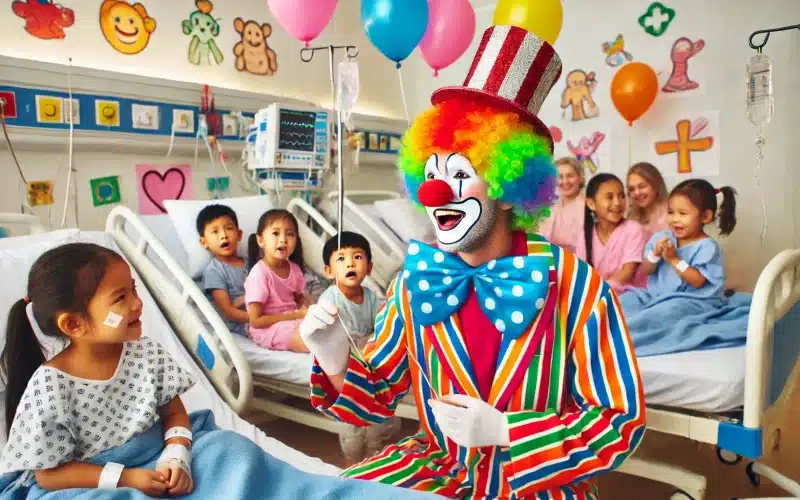
Medical clowns have become an increasingly common sight in pediatric wards across the world. These trained professionals use humor, playfulness, and empathy to entertain and support young patients. While clown visits are known for lightening the mood, there’s mounting evidence that they could also have a more tangible effect: reducing the amount of time children spend in the hospital.
A report in New Scientist titled “Clown visits may shorten the amount of time children spend in hospital,” highlights research pointing to the therapeutic potential of these clown interventions. The article suggests that visits from clowns can reduce stress, anxiety, and even pain in pediatric patients, factors that can lead to shorter recovery times .
Clowns and Healthcare: How Humor Helps Healing
Hospital clowns, often referred to as “clown doctors,” are more than mere entertainers. They undergo specialized training to interact with patients, especially children, in clinical settings. The psychological benefits of humor are well documented in medical literature. For instance, laughing has been shown to increase endorphin levels, the body’s natural painkillers, and decrease cortisol, the stress hormone.
One powerful example comes from a study published in the European Journal of Pediatrics. Researchers explored the impact of clown visits on children awaiting surgery. The study found that clown interactions significantly reduced preoperative anxiety. This is crucial because lower anxiety levels can lead to smoother operations and quicker postoperative recovery. One case highlighted a child who, initially terrified of the hospital environment, became relaxed and cooperative after a few minutes of playful interaction with a clown, allowing doctors to proceed with fewer complications .
Clown visits may shorten the amount of time children spend in hospital https://t.co/oeHRlN5ZEw
— New Scientist (@newscientist) September 8, 2024
In another example, the Journal of Pediatric Psychology reported that children undergoing painful procedures, such as blood draws or IV insertions, showed reduced anxiety and reported less pain when hospital clowns were present. One young boy, facing a particularly difficult blood draw, was initially resistant and in tears. After a clown started engaging him in a simple magic trick, the boy’s focus shifted, and the procedure was completed without incident .
Shorter Stays Through Laughter: How Clowns May Help Recovery
Reduced stress and anxiety aren’t just about making children feel better in the moment; they have broader implications for physical health. When patients are more relaxed, their bodies can devote more energy to healing. Stress, on the other hand, can weaken the immune system and slow recovery.
In some cases, clown interventions may even prevent complications. Consider a young girl with asthma, who was experiencing breathing difficulties in a hospital. Initially tense and uncooperative, she refused to use her inhaler properly. A clown gently approached her with balloon animals and playful gestures, distracting her from her fear of the inhaler. After the interaction, the girl used the inhaler correctly, avoiding a worsening of her condition that could have prolonged her hospital stay.
Global Initiatives: Clown Programs Around the World
Hospital clowns are not limited to individual hospitals; global programs are making these interventions accessible to more children. Clowns Without Borders, for example, operates in hospitals and crisis zones worldwide. In Europe, studies show that clown visits not only reduce anxiety but also foster positive relationships between patients and healthcare providers, improving overall hospital experiences. In one refugee camp in Greece, Clowns Without Borders engaged children who had experienced severe trauma, helping them regain a sense of normalcy. The hospital reported that those children were more responsive to medical care and recovered more quickly than expected .
Closer to home, the Big Apple Circus Clown Care program in New York has been a pioneer in using clowns to improve pediatric care. Their long-running program sends clowns into hospitals to perform for children facing chronic illnesses or long-term treatments, with hospitals reporting higher levels of patient satisfaction. In one notable case, a young cancer patient, who had been refusing treatment due to fear, began to cooperate fully after forming a bond with a visiting clown. His increased compliance allowed the medical team to administer life-saving treatment more effectively, leading to a shorter-than-expected hospital stay.
The Future of Medical Clowning: Expanding the Role of Humor in Healthcare
While the precise mechanisms through which clown visits may shorten hospital stays are still under investigation, the evidence is promising. By reducing emotional distress and promoting cooperation during treatments, clowns offer more than entertainment—they create a health-supportive environment. Their ability to introduce normalcy, joy, and distraction into the clinical setting reduces anxiety, which can lead to quicker recoveries and shorter hospital stays, directly benefiting children’s overall health.
One final example involves a hospital in Brazil that implemented a clown intervention program specifically for children recovering from surgery. The program, which paired clowns with medical professionals during post-surgical care, resulted in an 18% reduction in the average length of stay for patients. Children were more engaged during physical therapy sessions and reported higher levels of satisfaction with their health care, a factor linked to faster recovery.
While more research is needed to fully understand how clowns influence hospital stays, it’s evident that the benefits go beyond smiles and laughter. By easing emotional burdens and fostering a positive health atmosphere, clown doctors are helping children recover faster, both emotionally and physically.
